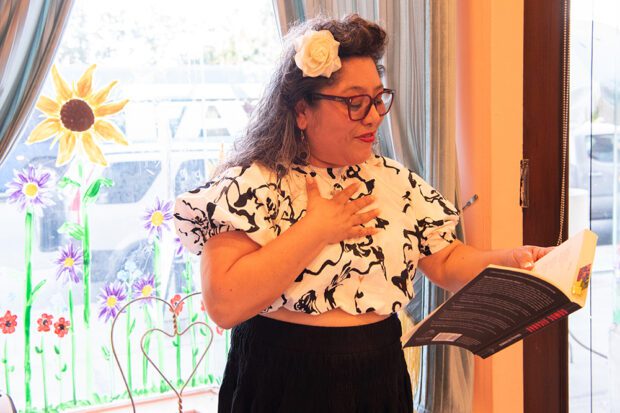
(Author’s note: In the June issue of the Community Alliance, we introduced you to Fresno’s newly appointed 2025–2027 poet laureate, the provocative local Chicana artist Aideed Medina, and her emerging struggle as a precocious young first-generation American growing up in the California public school system in the 1980s. Now, we invite you to get to know her better.)
“I was seven years old and I didn’t know, I didn’t know what racism was,” Medina recalls incredulously.
Mrs. Ashton, her second-grade teacher, had just finished ridiculing and mocking her in front of all of her classmates about her special “booklet”—some stapled sheets of paper put together as a makeshift journal, chock-full of stories, plays and poems.
“My mom and dad had always taught us to be really obedient to authority figures—like you know, to priests and teachers, which is why they’ve gotten away with so much shit in society—it’s embedded in our culture,” she remembers.
“And so I thought I had done something wrong. But what I really learned was to not bring my writing to school and to not show anybody what I could write.”
“It made me be aware and understand that there was something dangerous about me writing.”
Yet what was so confusing to Medina was that she derived so much joy from writing but now had convinced herself that it must be a bad thing. For a child, this is an incredibly damaging polar dynamic—one that Medina now recognizes to have a lot to do with her later struggles with depression.
“So I just hid it from the world,” she continues woefully. “Like I kept writing at home, and I would keep my journals at home. But even then I would hide it even more.
“I would hide it from my parents. I would hide my journals, my notebooks and everything I would write because I thought I was doing something bad.”
As a young kid in elementary school, Medina loved to escape into different realities by writing fanciful stories about magical creatures like dragons, her childhood fascination. She just could not stop writing even though she had been vilified for doing so at such a young age.
Medina could not accept Mrs. Ashton’s racist rebuke that she was “nothing special.” Deep down inside, she knew she was more than “just a dirty little wet Mexican girl.” So, she kept on writing.
Medina ended up changing elementary schools and was able to publish her first little book at Frank Paul Elementary in Salinas—about dragons. It was a fun short story for a cute little fourth-grade class project where the teacher binds your story up for you and makes you feel good about writing and becoming a new author. But Medina felt stupid.
“I’ll never forget the fact that I misspelled my own name on that shit! I misspelled my own name on my first book, and I just remember feeling some type of way about it like, ‘that’s right, I’m garbage ’cause I can’t even write my own name correctly on my own book,’” she recollects cynically.
The next year, in fifth grade, Medina wanted to redeem herself by submitting the best poem she could write in the school’s yearly poetry contest.
“I thought, you know, it’s time, it’s safe,” she recalls, “like, I can show someone what I write and not be afraid.”
So she wrote her heart out and produced her best elementary school poem yet. She brought it to school proudly thinking, “It’s really good.”
The next week, she got called into the principal’s office, and being the little “cocky” orgullosa (proud) “punk” that she was, she was convinced that she was being summoned because she had won the poetry contest’s grand prize. She walked into the office with her head held high.
“Do you know what plagiarism is?” the school officials sternly asked her right after she walked in. Despite her “awesome vocabulary” at the time, the truth was no, Medina had not yet learned what plagiarism was as a fifth grader.
But, that’s exactly what the officials accused her of, calling her parents into the office and telling them that it was just not possible for a daughter of farmworkers, whose primary and home language was Spanish, an ESL learner—that there was just absolutely no way—that little, young Medina had written the poem that she submitted for the contest. They demanded to know what book or what song, TV show or movie, she had stolen it from.
At first, Medina’s dad and mom were confused. They knew that Medina loved reading books and had so many different kinds at home, and so they understood the realm of possibilities in her writing. They immediately disagreed with the school officials.
In Spanish, her dad accused them of calling young Medina a mentirosa (liar)—something that he was prepared to denounce in order to defend her honor. The school officials brought in the vice principal—a Spanish-speaking Mexican-American to explain their case.
“My dad was pissed and so mad—he gave them a piece of his mind and convinced the officials to reconsider,” she explains with pride. “And so I won the prize alongside two other friends, and they put my name in the school’s giving tree,” she fondly remembers.
Yet the accusation left a mark on Medina’s early work and self-worth. First, in her early elementary school years she had been told that her writing meant nothing and would never amount to anything, and just a few years later it was now just “too good” to even be hers. This confusing contradiction was difficult to understand for young Medina.
Her teachers and school officials could not understand or appreciate Medina’s passion and creativity for writing. And they would never understand her immigrant parents’ desire to learn vicariously through her reading and writing at home. For example, Medina’s dad would regularly have her read popular English books out loud and then translate them on the spot for him—perfect literary and translation training!
“That’s why I was so fluent, you know—my dad made me read the Autobiography of Malcolm X when I was like 10 years old, and then just to balance me out, he also made me read the autobiography of Lee Iacocca, the famous businessman and chairman of Chrysler,” she says sentimentally.
“I guess this was my Dad’s way to get free child labor,” she says with a chuckle, “for which I’m very grateful to him. Malcolm X was some awesome shit! Especially when you have to translate it.”
“It’s like you’re diving even deeper into it—awesome stuff!” she relives with a smile. “It was all pretty interesting as a kid—I was a 10-year-old thinking like, ‘Oh shit!’ It was like somebody was putting me up on game, teaching me something important, ’cause I had never even considered at that age the things that I was reading,” she thoughtfully confesses.
Young Medina would also join her father in his farmworker rights struggle during those times. She writes about a sentimental yet funny time she went with him and her younger brother on the picket line in front of a grocery store in her 2023 poem “Picket Line Baby,” published in the Farmworker. Here is an excerpt:
White women give my father shaded looks.
Bringing babies to do their dirty work,
mumbled in passing.
I am paid in jelly doughnuts
for my day on the boycott.
My dad leads my baby brother
to the front of the grocery store doors
for a meeting with the manager:
two men
and a five-year-old interpreter.
Forget the past humiliation,
for not speaking English
for not accepting the union’s terms
for not dumping Chiquita Bananas in the back alley dumpsters
for laughing and cursing at him
in front of his children.
Medina writes what is real because she writes about her life and personal experiences. She captures the moment and mixes it with her vivid imagination to put it down on poetry paper so that readers can feel the vivacity of the moment and receive its magical energy.
She herself is magical.

